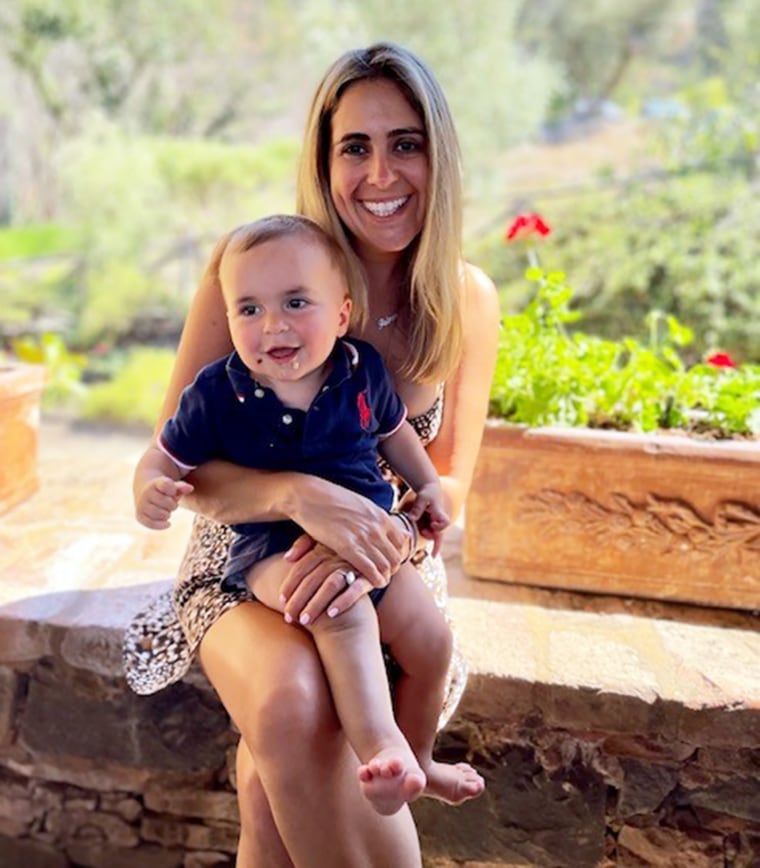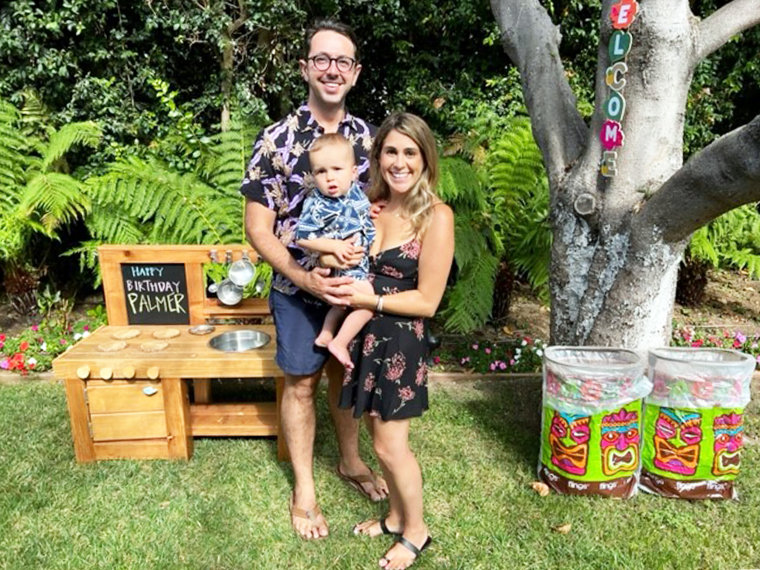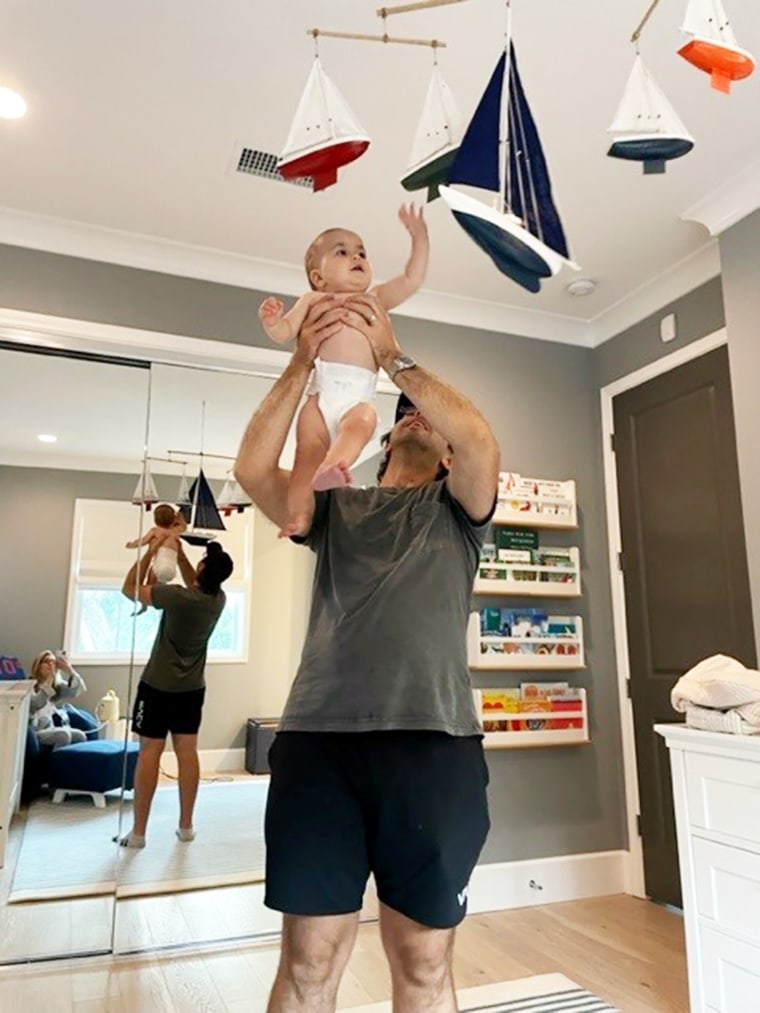For several weeks, Mari Henderson felt a canker sore on the left side of her tongue. It seemed annoying but she thought it might simply disappear. Then she read an article about a woman with the same symptoms. Reading that article encouraged Henderson to see a doctor.
“This is a 34-year-old woman, like the same age as me, who also has tongue cancer,” Henderson, 35, of Los Angeles, tells TODAY.com. “I felt like I should get a biopsy.”
The biopsy revealed that Henderson also had tongue cancer.
“The number one thing that I want people to know is from what my dentist said — a canker sore goes away in three weeks,” she says. “If there’s something that doesn’t go away, get it checked out and be persistent.”
A canker sore that lasted for months
Last December, Henderson was home on maternity leave with her first child when she noticed a tender spot on the left side of her tongue. She thought it was a canker sore and tried various hydrogen peroxide solutions to treat it.
“I was using mouthwashes and stupidly ignoring it and thinking it would go away,” she says. “I thought it was a canker sore.”
Henderson returned to work and didn’t think much of it between work, mothering and breastfeeding. In March, she visited the dentist and mentioned the ulcer.

“He was like, ‘No this is white.’ He said, ‘This is not a canker sore,’” she recalls. “He also told me, which I didn’t know, ‘Canker sores only last for three weeks and go away. Canker sores do not last for four months.’” Still, the dentist didn’t seem overly worried and told her to see a doctor if the spot was still there at her follow up appointment in six months.
“That’s when it started to click for me again,” she says.
Twelve years ago, Henderson’s older brother had tongue cancer. But they were told it wasn’t a genetic cancer so she shouldn’t be at greater risk.
“That was a really rare, crazy thing that happened to my brother who’s 10 years older than me,” she says. “When the dentist said it’s not a canker sore that’s when I was l like, ‘OK (I should see a doctor).’”
She visited an ear, nose and throat doctor who prescribed her liquid steroids to treat her tongue.
“I would take a little cotton swab and tweezers and put it on that site on my tongue like four times a day for two weeks and see if it would shrink or go away,” she says. “I called my brother, and he was like, ‘I did the exact same thing for nine months.’”
He urged her to ask for a biopsy because after he took steroids for all those months, he was ultimately diagnosed with cancer. That’s when she read the TODAY.com story about Katie Drablos, who had tongue cancer. Taking all this into consideration caused Henderson to ask for a biopsy and the doctor agreed.
“He was like, ‘It hasn’t shrunk,’” she says. “I was like, ‘I’m just going to get it biopsied.’”
Henderson didn’t understand how intense the biopsy would be and didn’t even take time off from work. The doctor removed a swath of her tongue.
“I didn’t realize it was going to be a full excisional biopsy, meaning they were removing what they thought at the time was the whole (tumor),” she says. “I couldn’t speak or eat anything but liquids for two weeks.”
The biopsy revealed Henderson did have cancer. She thought because she had an excisional biopsy that she might not need further treatment. But, her sister-in-law is also an ear, nose and throat doctor and looked at the results. She recommended Henderson undergo a second procedure because “the margins aren’t big enough.”
“When you have cancer you need to have very clear margins to make sure there’s less of a chance of recurrence,” Henderson says.
Her sister-in-law connected her with a head and neck surgeon at UCLA who agreed Henderson needed a second surgery after the swelling reduced the first procedure. She worried about how losing more of her tongue might impact her career as an attorney.
“That was the only time I cried. I was like, ‘I don’t want this to impact my speech,’” she says. “He was like, ‘I can’t guarantee it won’t impact your speech. The only thing that would be a 100% guarantee that it doesn’t impact your speech would be radiation.’”

Henderson decided to get surgery instead of radiation because that’s what the doctor recommended.
“Because of the size of the tumor, I didn’t need to have a graft,” she explains. “If he cut farther into my tongue at a point you have to have a graft from another part of your body, which is more recovery and more of a likelihood of a speech impediment long term.”
What causes tongue cancer?
In the past, tongue cancer impacted a small, well defined group — men over 60 who smoked and drank. That has been changing.
“We’ve started to see anecdotally in the last 10 years … a shift to a younger age group, and by younger, I mean below the age of 40 unrelated to previous drinking and smoking history,” Dr. Diana Kirke, an otolaryngologist at Mount Sinai Hospital, told TODAY.com in April 2022. “Early evidence says the rise is true, but we don’t actually have all the data to say it’s true.”
Henderson’s tongue cancer was stage 1 and the doctors said it was not related to HPV. According to the National Cancer Institute, HPV can cause cancer in the throat and “back third of the tongue.” The doctors remain unsure as to why Henderson had it.
“They don’t have any ideas,” Henderson says. “I have none of the risk indicators.”
The National Organization for Rare Disorders says symptoms of tongue cancer include:
- A sore on the side of the tongue that doesn’t heal.
- An easily bleeding ulcer.
- Tongue pain.
“If you have any ulceration in the tongue that lasts longer than two weeks, you absolutely need to get it looked at,” Kirke told TODAY.com in April. “If it persists, it needs to be biopsied.”
Sharing her story
When Henderson went to doctors’ appointments, she often was the youngest person in the waiting room by decades and she yearned to talk with someone her age with a similar experience. Henderson connected with Drablos, who had stage 4 tongue cancer, and they struck up a friendship.
“(I) told her, ‘Thank you for your story and for raising awareness because ultimately reading your story is what caused me to act so quickly and it saved me from the extent of treatment that you had,’” Henderson says. “It’s nice to have someone else who’s like my exact age across the country going through the same thing and someone who can understand it.”

Henderson felt so grateful that Drablos’ story encouraged her to undergo a biopsy, she also wanted to share her experience to help others.
“I’m out here able to talk to you today normally because I didn’t wait on it even longer. So, I’m very lucky,” Henderson says. “Prioritize your health and do not put it on the back burner and ignore things.”